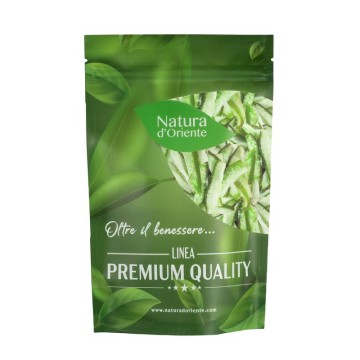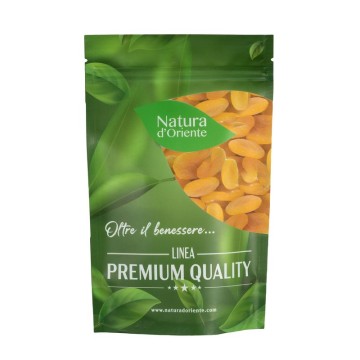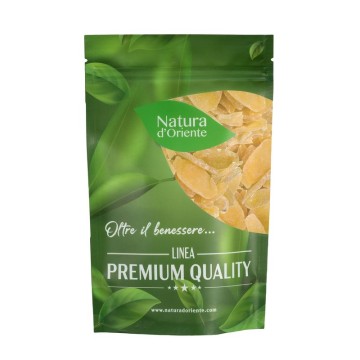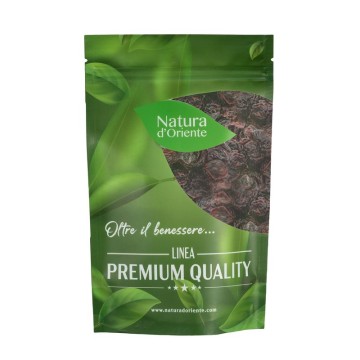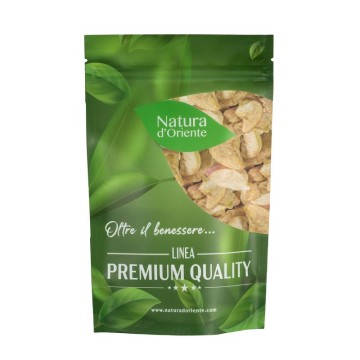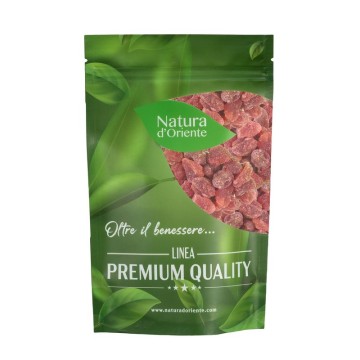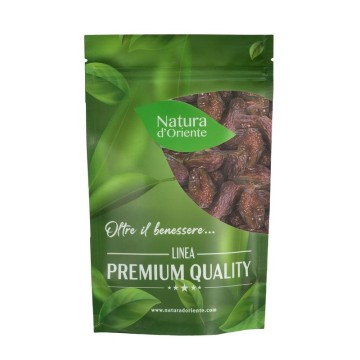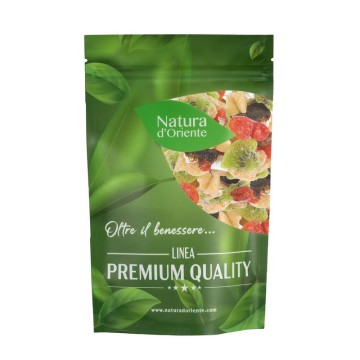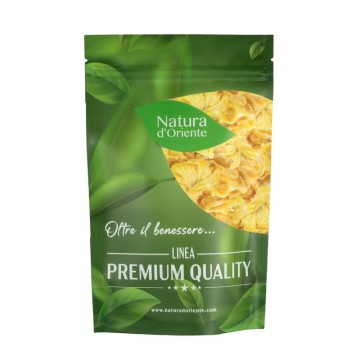Natural dehydrated melon without sugar
Tasty, fragrant, rich in beneficial substances: the sweet-tasting melon, even in its version of dried melon, helps the human body to keep fit. Let's see how!
Natural dehydrated melon: properties and benefits
As a summer fruit, it releases its scent and invites us to taste it. In its natural dehydrated and sugar-free form, the melon still retains all its palatability and the aroma it attracts. Good, given the many properties of this berry - yes, it is not a real fruit but a false round berry, coming from the pumpkin family.
The version of the dried melon, like the fresh melon, always has an optimal dose of nutrients: vitamins A, C, D, PP, beta-carotene, riboflavin, pyridoxine, folic acid, iron, sugars, minerals, proteins and fibers.
In natural melon we also find folic acid , which can be valuable for women during pregnancy and menopause.
Speaking of vitamins, an important element is the beta-carotene pigment, known for its beneficial effects on the skin, both for the brightness of the skin, and for counteracting ailments such as acne or dark spots. Beta-carotene also works by strengthening the hair, nails, and helps protect the skin before sun exposure, as well as maintaining a tan afterwards.
Remember that a part of beta-carotene can be transformed into vitamin A by our body. Among the main health benefits of beta-carotene which becomes vitamin A in our body, there is also the protection of the well-being of sight and eyes.
In addition to vitamin A , the melon fruit has B vitamins and vitamin C, vitamin E and K . Furthermore, the dehydrated natural melon makes available rich quantities of sodium, magnesium, potassium, iron, copper.
Even in the version of the natural dehydrated and sugar-free melon, this fruit can be an advantageous antioxidant food, given the presence of vitamin C, also known to strengthen the immune system
Its availability of potassium makes the fruit suitable for protecting cardiovascular health and can help us fight stress.
The dehydrated natural melon also has some laxative properties, thanks to the fibers that help reduce the feeling of hunger in a natural way. Compared to other foods containing fiber, however, in the dried version, the fruit does not cause swelling by taking up space in the stomach.
Origins and History of cultivation
.jpeg) The melon plant probably dates back to its formation in the hot countries of Africa and Asia. It belongs to the Cucurbitaceae family, like the watermelon and cucumber, and according to some scholars, it could also come from ancient Persia.
The melon plant probably dates back to its formation in the hot countries of Africa and Asia. It belongs to the Cucurbitaceae family, like the watermelon and cucumber, and according to some scholars, it could also come from ancient Persia.
The melon was already appreciated by the ancient Egyptians, who cultivated it along the banks of the Nile, and through their trade it was exported to the Mediterranean basin. According to some findings in Sardinia, the melon plants arrived during the late Bronze Age (about 1300 BC).
It arrived in the rest of Italy during the rule of the Roman Empire, and the melon is mentioned by Pliny in his book Naturalis Historia (1st century AD). It spread throughout the Mediterranean basin in the Middle Ages, and has since been grown in warm climate regions, although some varieties can grow at lower temperatures.
Melons arrived in America in the Renaissance, and today the plants are grown in many countries around the world, where the climate allows it. Most melons are sweet and are eaten fresh, although some varieties can be made into preserves or brine, or dried as in the case of natural dehydrated melons, without sugar or with added sugar.
Plant and Fruit
The Melon plant is the Cucumis melo , a climber of the pumpkin family, the Cucurbitaceae, and is grown mainly for its edible fruit.
Melons display large round or lobed leaves and unisexual yellow flowers. Botanically, the fruits are a type of berry that we know as a peponide, so they are not real fruit. They vary a lot in size, shape, texture and color. They appear with shades between yellowish, whitish, brown, greenish and are longitudinal stripes. Usually melons weigh about 1-4 kg.
The flavor of the melon pulp can vary according to the variety, and in the cantaloupe and netted melons varieties, they give off a sweet fruity smell when matUranus.
Other varieties, those called winter melons, are ripe when they turn yellow; they ripen late and slowly in the deposits, for many weeks, becoming softer but not sweeter.
In terms of environmental requirements, Cucumis melo usually germinates 8-10 days after sowing, at a temperature between 25 and 28 ° C, and the minimum heat tolerated is 15 ° C.
The timing of its growth also depends largely on whether or not it is in a temperate-warm climate. In Italy, this plant is grown throughout the summer, given the favorable temperatures.
Nutritional values of natural dehydrated sugar-free melon
Especially in this sugar-free version, melon is less caloric than other dried fruit, with about 360 Kcal per 100 grams. On the analysis it is low in fat (0%), but contains fiber, protein, potassium (about 300 mg / 100g), magnesium, calcium, iron and phosphorus.
Contains a decent dose of Vitamin B1 - Thiamine (about 0.40 mg / 100 g), Vitamin B3 Niacin (about 6 mg / 100 g), B5 (pantothenic acid) and B6 (pyridoxine) and Vitamin K (2.5 µg / 100 g).
In addition, it is rich in vitamin A - Retinol (189 µg / 100 g) and Vitamin A (7169 µg / 100 g), Beta-carotene (2020 µg / 100 g). It also contains a good dose of folate (21 µg / 100 g).
How to consume dehydrated natural melon in the kitchen or as a snack
dried melon is a delicacy with an exquisite taste, often used in its sugar-free version as a satiating and satiating snack.
It can be added to salads, on ice cream, to prepare desserts and cakes, muffins and cupcakes. In addition, dehydrated melon is tasty in yogurt, natural drinks and smoothies.
This dried fruit is often used in cereal or dried fruit mixes, and in some exotic recipes as dehydrated natural melon can give a special taste. It is also used in the preparation of tea, to flavor it without added sugar.
Like many dehydrated fruits, natural dried melon can be used as a snack for athletes, and an ingredient in the preparation of energy bars.
Natural dehydrated melon: side effects and contraindications
There are no particular contraindications to taking this dehydrated fruit, but diabetics are advised to refrain from consuming it too often due to the high level of sugar present. Even in this version of natural melon and without added sugar, the natural carbohydrates are still those of the fruit.
In large doses, natural dried melon could cause a laxative action .

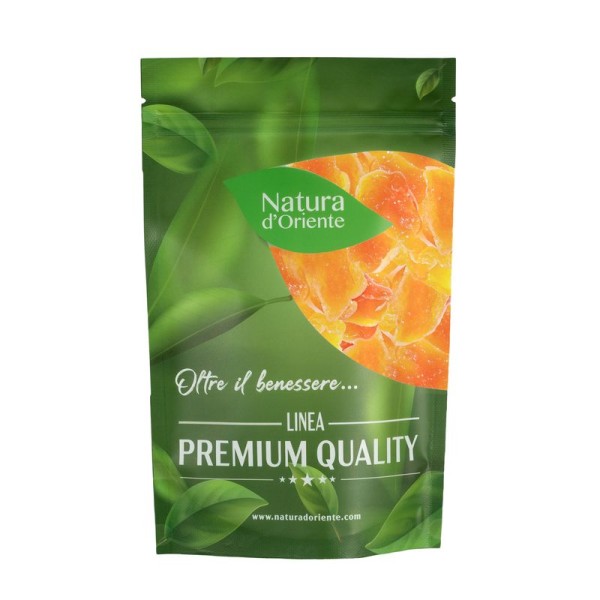







 No reward points for this product.
No reward points for this product.
.jpeg) The melon plant probably dates back to its formation in the hot countries of Africa and Asia. It belongs to the Cucurbitaceae family, like the watermelon and cucumber, and according to some scholars, it could also come from ancient Persia.
The melon plant probably dates back to its formation in the hot countries of Africa and Asia. It belongs to the Cucurbitaceae family, like the watermelon and cucumber, and according to some scholars, it could also come from ancient Persia.